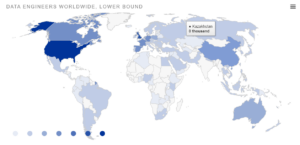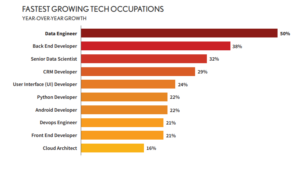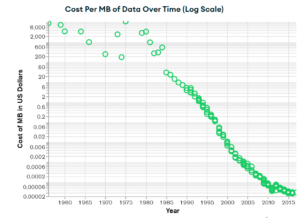Today’s business world is witnessing a rise in demand for data science and related academic subjects. More companies are hiring data scientists and analysts to understand their business KPIs and performance better. The discipline of data engineering is quickly gaining popularity within data science itself.
To make sense of huge, complex data sets, data engineers collaborate closely with other data experts, including scientists, analysts, and architects. As a result, in the current corporate environment, data engineering is one of the most profitable job profiles. Naturally, a decent data engineer job is sought after by innumerable people worldwide.
Ironically, data engineering is the fastest growing job profile among data scientists, analysts, and engineers. According to a report by Stitch Data, the number of data engineers more than doubled between 2013 to 2015. The infographic below shows the distribution of data engineers across the world.

Source: Stitch Data
Who are Data Engineers?
Data engineers are specialists who create and maintain data pipelines so that data scientists and analysts may access the information more easily. Data engineers lay the foundation for data gathering, administration, storage, and transformation within an enterprise. To ensure that the subsequent work of analysis, visualization, and the creation of machine learning models can be done in a seamless, continuous, secure, and efficient manner, they supervise the development, construction, and maintenance of data processing systems and database architecture.
The modern business scenario is highly data-driven, where companies make their business decisions based on intricate calculations. This data-intensive business model makes it necessary for corporations to hire data professionals like data engineers to be in extremely high demand. The graph below shows that data engineers are among the most in-demand job profiles across the tech industry.

Source: Dice Tech Job Report
Data Engineering Skills In Demand
Despite the strong demand, getting a good data engineering job is harder than it seems. Data engineers must have a portfolio of skills and competencies that make them capable of performing their duties efficiently.
Douglas B. Laney, the author of the famous book, Infonomics has this to say about data engineers in modern businesses “Most companies have an IT organization, but they haven’t thought of the possibilities of decoupling the ‘I’ from the ‘T’ and managing information and technology as separate assets.”
Therefore, companies must employ skilled data engineers proficient at building solid data pipelines for efficient business results. Here are some necessary skills that data engineers must possess in today’s corporate world.
-
Coding
Coding is arguably the primary skill in demand for data engineers, as most tend to come from a software engineering background. A report by Stitch data mentioned that more than 40% of data engineers had worked previously as software engineers. Naturally, tech companies looking to hire top-quality talent are looking for data engineers adept at coding and programming techniques.
Moreover, candidates should excel in coding in multiple languages to increase their chances of getting the most suitable data engineering jobs. Python, Java, MATLAB, C & C++, SAS, R, and Scala are some of the most well-known programming languages that a skilled data engineer should know.
-
Profound knowledge of SQL
SQL is arguably the most important language for a highly qualified data engineer. SQL stands for Structured Query Language and is helpful in handling structured data to draw meaningful conclusions. SQL is mainly used for working with massive amounts of datasets that are in tabular form.
According to the same Stitch Data study, more data engineers see SQL as their most crucial skill than any other programming language. The language first appeared in the 1970s and has seen many upgrades since, but it still remains one of the most valuable tools in the arsenal of data engineers.
-
NoSQL
While SQL is mainly used for tabular datasets, NoSQL goes beyond this and works with complicated data types. While there is no clear consensus about what it stands for, most experts agree that NoSQL deals with any other type of data except relational tabular databases. As the storage cost dramatically decreased since the dawn of the 21st century, more companies began shifting to NoSQL databases. The graph below shows the decreasing data storage costs over the last 50 years.

Source: MongoDB
MongoDB, Cassandra, HBase, and Amazon Neptune are among the most popular NoSQL database management systems, each having features and benefits. Nowadays, recruiters expect a data engineer to be an expert in these unique NoSQL technologies. The more NoSQL systems you can handle, the higher your chances of getting a decent data engineering job.
-
DevOps
DevOps integrates two computer science fields, software development and IT operations, hence the name DevOps. The primary goal of DevOps is to shorten the software’s lifecycle while ensuring the highest quality and providing continuous delivery. DevOps is done through various tools and technologies available in the current market, many of which are open source.
A deserving data engineering professional should have a deep-rooted knowledge of these DevOps platforms and tools. The best DevOps platforms for data engineering are Github, Jenkins, Gearset, Gitlab, and Buddy.
-
Cloud Computing Tools
Cloud computing is at the forefront of today’s technology environment, with multiple state-of-the-art tools available to data professionals. More and more businesses are shifting their operations to the cloud, either fully or partially. Gartner’s report suggests that more than 75% of all global databases will be on a cloud platform by 2023, giving rise to more complexity in data governance.
Naturally, recruiters and hiring managers expect a good data engineering candidate to be adept at using the most well-known cloud computing platforms in the market. Amazon Web Services (AWS), Google Cloud Platform (GCP), Microsoft Azure, and Openstack are some of the most widely used cloud computing services in the corporate world.
-
Data Warehousing Tools
Building and using a data warehouse is known as data warehousing. A data warehouse is a central archive of information that can be examined to help decision-makers become more informed. Transactional systems, relational databases, and other sources regularly and continuously feed information into a data warehouse.
Data consolidation, data integration, and cleaning are all data warehousing components. Microsoft Azure, Amazon Redshift, Snowflake, and Google BigQuery are some of the best data warehousing tools available today. Tech companies expect their data engineers to have substantial knowledge of these data warehouses and how to get the best results.
-
Data Mining Tools
Data mining is the process of taking information out of massive datasets to find patterns, trends, and pertinent information that would enable the business to make data-driven decisions. It’s a sophisticated data analysis technique that combines machine learning and AI to extract helpful information, which helps organizations understand the demands of their consumers better, boost revenues, cut expenses, strengthen relationships with customers, and do much more.
Modern data engineers use a wide range of data mining tools and technologies to extract useful information from unstructured and large data sets. Oracle Data Mining, IBM SPSS Modeler, Knime, Orange, and Kaggle are some of the leading data mining tools in the global market.
-
Data Visualization Skills
Besides extracting, manipulating, and examining data, data visualization is among the most crucial responsibilities of a skilled data engineer. The graphic display of information and data is known as data visualization. Data visualization tools offer a straightforward approach to observing and analyzing trends, outliers, and patterns in information by utilizing visual elements like charts, graphs, and maps. Furthermore, it offers an excellent tool for company employees or corporate executives to deliver data to non-technical audiences.
According to a report by Tableau, managers are 28% more likely to find timely information in firms with visual data recovery solutions than those that rely on managed reporting and dashboards. Therefore, more and more companies are looking for data engineers adept at data visualization tools like Tableau, Google Looker, Power BI, and Azure Synapse.
-
Machine Learning and AI
Artificial Intelligence and Machine Learning are two of the most popular technologies today, with numerous applications in multiple industries. Usually, both these technologies are handled by data scientists to carry out complex data analysis and operations. However, a basic understanding of Machine Learning and AI is a must for an in-demand data engineer. Data engineers must be able to work with data scientists on complicated Machine Learning projects and have a conceptual understanding of the same.
-
Soft Skills
Many professionals in a technical field like data engineering often overlook the importance of soft skills in finding a good job. These are non-technical skills that are equally important as their technical counterparts, like coding or data warehousing. Soft skills include a person’s ability to communicate effectively, time management, adaptability, resourcefulness, and many others.
The most vital soft skill is arguably effective communication, as it is necessary for today’s business environment. Besides their technical prowess, data engineers must have a strong portfolio of soft skills to stand apart from the crowd.
Final Words
Data scientists, analysts, and engineers are among the job categories with the most remarkable growth worldwide. They are essential for businesses that rely extensively on Big Data and related technologies and employ data-driven techniques to enhance operational efficiency. However, the competition for the best data engineering jobs is fierce, and candidates must have the necessary skills to be sound data engineers.
For more information about the data engineering skills in demand, contact our organization. We’re healthcare IT recruiters and our renowned for having years of experience in the area.
Get in touch with us at BenchPoint right away!
